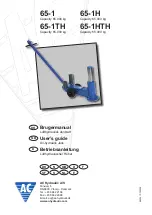
Husky Stabilizing Scissor Jacks
*** BEFORE INSTALLATION: READ ALL INSTRUCTIONS. ***
WARNING: Raising the corners or extreme ends of the trailer to excessive height can cause damage to the trailer.
Rev.02/21/2017 © DTS Manufacturing, Wilsonville, OR 97070 / DTS reserves the right to modify appearances and specifications without notice.
Product Specifications
Vertical Height (max.)
24 in.
Maximum Lift Capacity
5000 lbs.
7500 lbs.
Retracted Height
4-
5
/
16
in.
4-
5
/
16
in.
Foot Pad Area
26 in.
2
26 in.
2
Shipping Wt. (appx.) (set of 2)
30 lbs.
35.75 lbs.
Tools Required for Installation
• Marker
• Drill bits: 1/8in & 11/32in
• 10-15’ string
• Center Punch
• Drill
• Safety goggles
• 9/16" Wrench
• Hammer
Installing the Scissor Jacks
1.
Park the trailer on a level surface and block the wheels.
2.
Position each Husky Scissor Jack under the trailer frame where it will
be installed. Choose front or rear installation as shown in
Figure 1
.
FRONT INSTALLATION:
Jacks sh
ould be 6’-8’ behind the coupler.
REAR INSTALLATION:
Jacks should be approximately halfway
between the rear axle and the end of the trailer. Ensure that there is
adequate ground clearance by running a length of string from the
bottom of the rear wheel to the back end of the trailer frame, as shown
in
Figure 1A
. Use the string to visualize the available installation
space for the jack. Ensure that the hex drive is accessible.
NOTE:
Any object extending below the string is more likely to
come in contact with the ground when driving over inclined
surfaces
.
3.
With each jack in position on each side of the trailer, extend each jack
to make contact with the trailer frame as follows.
a)
With jack #1, slide the socket end of the crank onto
the hex head on the jack.
b)
Turn the crank clockwise just until the jack begins to lift the trailer,
and then stop cranking.
4.
Using the pre-punched holes on the mounting plate as a template,
mark 2 screw locations on each side of the jack, for a total of 4 screws
per jack, as shown in
Figure 2
.
5.
Retract the jack and move it out of the way.
6.
Center punch the hole locations.
CAUTION:
To prevent getting metal particles in your eyes, wear safety
goggles while drilling overhead! Do not remove safety goggles
without first cleaning the particles from your face and hair.
To protect your hands from metal particles, wear gloves.
Before drilling holes, ensure that the drill will not damage
objects that may be installed on or within the trailer frame.
7.
Drill a pilot hole through the center punch using a 1/8
” drill bit, then drill
to its final size using an 11/32" drill bit.
8.
Reposition the jack and install the 4 self-tapping 3/8" x 1" screws, as
shown in
Figure 3
. Turn screws until they seat and are tight.
9.
Repeat all steps to install jack #2.
Using the Scissor Jacks
1.
Before unhitching your trailer, try to obtain the most level
position that ground conditions will allow. Some sites may
require wheel ramps or planking under the tire on the low side.
NOTE:
Always use wheel chocks when parking.
WARNING:
Do not use ANY scissor jack to lift the trailer off the
ground. Trailers are not designed to be raised off the ground in
this manner.
2.
Unhitch the trailer, and then use the tongue jack to level the
trailer front to back.
a) Beginning on the lowest side of the trailer, extend the jack
until it makes contact with the ground, then extend until the
trailer is level.
b) Then, on the opposite side of the trailer, extend the jack
until it makes firm contact with the ground for stability.
NOTE
: If the RV door does not swing evenly when opened or if
it sticks, retract the jacks and make sure the wheels are as
level as possible before starting over and extending the jacks.
Maintaining the Scissor Jacks
Twice a year, lubricate the drive screws with grease.
Once a year, clean the drive screw joints and threads to
remove any dirt or debris, and then re-lubricate.
Warranty -
The warranty period is 2 years, beginning on the date of
original retail purchase. This warranty covers failure caused by faulty
manufacturing or material defects, it does not cover rust, weather damage,
fading colors, commercial use or abuse/misuse. Warranty is limited to the
replacement of parts or unit at the manufacturer’s discretion. For warranty
assistance, contact [email protected] or (855) 242-8922.




















